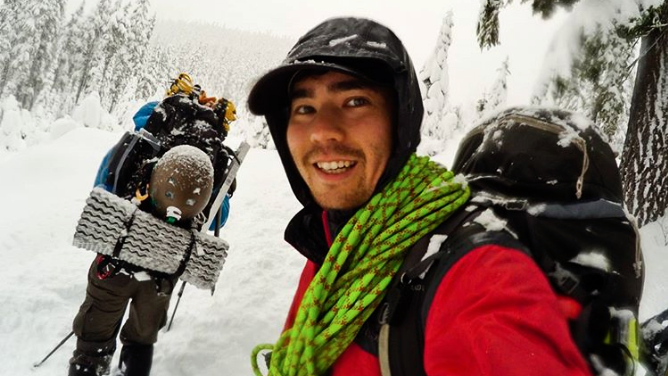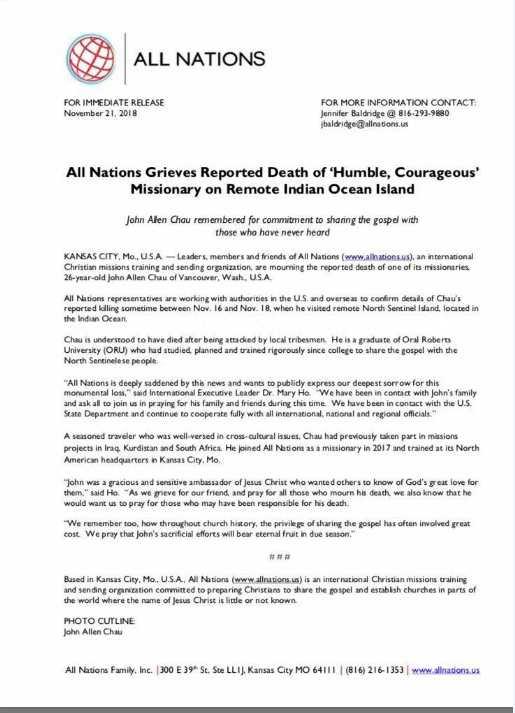
World
19:25, 06-Dec-2018
Indian official: Tribal conversion bid 'bigger crime' than trespassing
Updated
18:19, 09-Dec-2018
Khushboo Razdan

Three weeks after a young American was reportedly killed by a 60,000-year-old protected tribe for trespassing into their territory, the chief of India's top body for tribal affairs has told CGTN that the "bigger crime" was the apparent attempt at religious conversion.
John Allen Chau, a 27-year-old U.S. national, had been seeking to make contact with the tribe in India's Andaman Islands.
"A diary left behind by Chau for his friends and family suggests that he was pursuing a planned trip to influence the tribe into accepting Christianity," said Nand Kumar Sai, chairman of India's National Commission for Scheduled Tribes (NCST), in an exclusive interview with CGTN Digital.
"All the evidence that the investigative agencies have gathered so far indicate that he was trying to convert them; it's unethical and ignorant," Sai said, adding that the investigation is not yet complete.

John Allen Chau /Photo via his Instagram account
John Allen Chau /Photo via his Instagram account
While the Indian authorities are still struggling to retrieve Chau's body from the forbidden North Sentinelese Island, the incident has sparked a debate over missionary work and religious conversions.
A statement issued by All Nations, a Kansas-based missionary organization which is believed to be behind Chau's visit to the North Sentinel Island, appeared to confirm that his mission was to proselytize.
"We pray that John's sacrificial efforts will bear eternal fruit in due season," it said.
But not everybody is treating Chau as a hero of the faith.
"Chau could not have preached to these people, nobody speaks their language. How on earth could he have witnessed them?" wrote Rod Dreher, a popular Christian blogger in the American Conservative, a magazine that claims to promote "mainstream conservatism."
"Trying to convert an aboriginal tribe, a tribe about which we know nothing, what language they speak, what religion they follow, is a bigger crime than trespassing," Sai said, adding that it's even more foolish to treat Chau as a martyr.
Dr Pam Arlund, a member of the international leadership team of the group, in an interview with Christian Today admitted that All Nations was aware of Chau's plans to visit the protected Island as he had approached the group two years ago for help.

The statement issued by All Nations
The statement issued by All Nations
"It was his lifelong mission to reach the North Sentinelese people and share the love of God with them. We helped prepare and train him specifically in the areas of his long-term mission there," Arlund told Christian Today, "In preparation for his mission, Chau had identified and tried to receive 13 different immunizations to try to make sure that he didn't spread diseases."
That statement was shot down by activists.
"This displays an extraordinary level of ignorance which highlights why it's so dangerous for such people to contact these tribes," Jonathan Mozower, director of communications at Survival International, a non-profit organization that works for the rights of uncontacted tribes, told CGTN.
"They say he was medically trained. In fact, he had a degree in health and sports medicine and apparently some training in emergency medicine but he was not qualified as a medical doctor."

The North Sentinelese tribe has lived on the island for nearly 2,000 years. /courtesy of Survival International
The North Sentinelese tribe has lived on the island for nearly 2,000 years. /courtesy of Survival International
Sai told CGTN that he will ask the Indian government to revoke its decision to exclude North Sentinel island from the Restricted Area Permit (RAP).
"Foreign nationals have always had an eye on the primitive tribes of these islands and have made several attempts in the past to contact them. We need to protect such tribes, and their habitat should be completely closed for outsiders," he said.
In June this year, the Indian government excluded North Sentinel and 28 other islands from the RAP till December 2022.
Sophie Grig, a senior research fellow at Survival International, had previously accused the Indian government of passing an ambiguous ruling on visiting the restricted area.
"The lifting of RAP means foreigners can go to the island without permission from the government," Grig told CGTN Digital last month.
However, the NCST chairman maintained that even though the RAP has been withdrawn, any tourist wanting to visit the island needs prior permission from the country's forest department and the administration of the Andaman as the area is protected.

SITEMAP
Copyright © 2018 CGTN. Beijing ICP prepared NO.16065310-3
Copyright © 2018 CGTN. Beijing ICP prepared NO.16065310-3